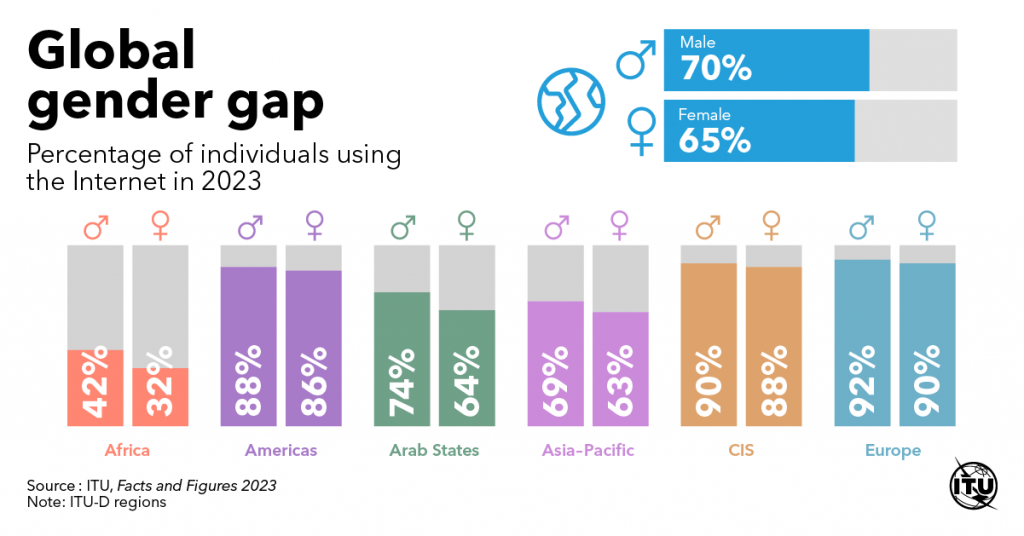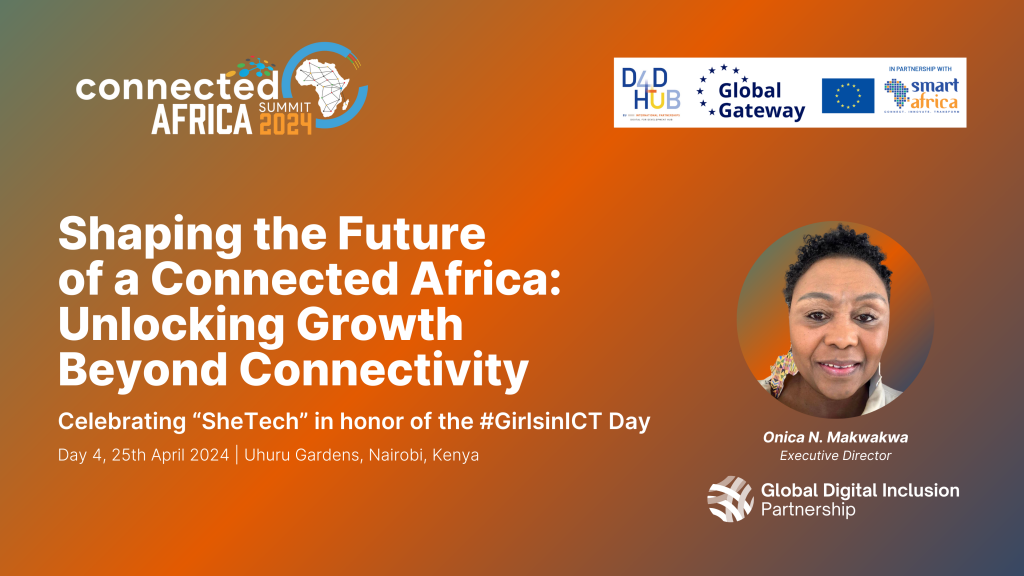This post was written by Ingrid Brudvig, GDIP Senior Research Manager.
This year’s Girls in ICT Day underscores a pivotal theme: leadership. It’s a global call to not only recognize the potential of young women and girls as leaders — but to act.
We call upon the global community to acknowledge and nurture the potential of young women and girls not just as participants but as leaders in the digital age. This day marks a collective call to action to inspire innovations and policies that ensure their prominent role in technology education and future careers in the digital economy, thereby advancing gender equality and economic development.

With nearly 244 million more men than women using the internet, a stark gender digital divide persists, particularly affecting women with low literacy, low incomes, rural dwellers, and those with disabilities. According to the International Telecommunication Union, only 30% of women in least-developed countries have access to the internet. GDIP’s Connected Resilience study highlights the significant role of education in women’s meaningful connectivity and access to digital possibilities. Despite women’s resilience in standing up to formidable challenges to access the internet for education, employment, entertainment, and family communication, systemic barriers such as poverty, early marriage, and education level create thick boundaries to women’s digital inclusion around the world.
Bridging the gender digital divide is not just a matter of equity but a catalyst for breakthroughs in education, healthcare, economic development, leadership, and more.
“It’s time to bridge this persistent divide with substantial specific policy interventions. Without them, the global economy stands to lose $500 billion USD in the next five years,” says Doreen Bogdan-Martin, ITU Secretary General, at the launch of GDIP’s Connected Resilience report at the 68th session of the UN Commission on the Status of Women in 2024.
Our call for action is unequivocal: we need young women and girls’ leadership in the digital age to create the digital future they wish to see and ensure inclusion for all.
Here are five actions policymakers, NGOs, and leaders in the digital development sector can take on this Girls in ICT Day to promote young women and girls’ digital inclusion and leadership.
By heeding these actions, policymakers can shift the digital landscape to one in which women and girls not only participate but lead.
- Invest in Community Solutions to Bridge the Gender Digital Divide: Transform schools into multimedia, computer, and internet centers, making them anchor tenants for community-wide connectivity and ensuring digital skills programs reach young women and girls by supporting youth digital ambassadors. Work with parents and guardians to develop supportive pathways that encourage girls’ access to technology at school and beyond.
- Support Community Networks: Adopt regulations to enable community networks — communication infrastructure constructed and deployed by local communities — to bridge connectivity gaps in underserved areas. This would ensure low-cost, reliable internet and foster safe spaces for women and girls to engage with technology. According to KICTANet, community networks have “contributed to dissolving technophobia for women and girls who feel comfortable learning to utilize technology in their own space to meet their specific needs.”
- Address Broader Gender Inequalities: Provide both formal and informal peer educational opportunities tailored to girls and addressing gender norms, including topics like menstruation and sexual and reproductive health. Inform girls about engagement with supportive online communities and take concrete educational and policy measures to combat online harms, including technology-facilitated gender-based violence.
- Build Digital Solutions with Young Women and Girls: Support innovations rooted in diverse, local knowledge and lived experience, led by local voices, especially those of young women and girls, to address their specific needs and enhance their well-being. This requires conscious efforts that put community consultation and community leadership front and center in the decision-making process.
- Increase Women’s and Girls’ Leadership in the Digital Sector: Public and private sectors should commit to implementing the EQUALS Leadership Coalition goal of ensuring that by 2030, 30% of tech leaders are women. Investing in current leaders sets a precedent for the next generation of women leaders in tech. Additionally, initiatives such as the ITU Secretary-General’s Youth Advisory Board empower young people to shape the future of global connectivity. This is a prime example of how global decision-makers can integrate the voices of girls and young women into policy processes.
This Girls in ICT Day, we urge policymakers, digital leaders, and community influencers worldwide to ensure young women and girls are at the forefront of designing and leading the digital future. Their participation is crucial in closing the gender digital divide and shaping a future where digital equality is a reality.

As part of UNESCO’s Information for All Programme (IFAP) webinar series, our team co-organized and will join its first session, “Gender Transformative Policy to Advance Digital Inclusion”, to highlight strategies tailored to address the unique challenges faced by women and girls in accessing and utilizing digital platforms. Register to join here: https://gdip.ngo/49O2PuU

Join Global Digital Inclusion Partnership Executive Director Onica Nonhlanhla Makwakwa for a dynamic and interactive discussion on bridging the gender digital divide and unlocking ‘She-Tech’ potential for a sustainable and inclusive economy at the Connected Africa Summit 2024. Learn more here: https://gdip.ngo/4aNcsLB
About GDIP
The Global Digital Inclusion Partnership is a coalition of public, private, and civil society organizations working to bring internet connectivity to the global majority and ensure everyone is meaningfully connected by 2030. GDIP advances digital opportunities to empower and support people’s lives and agency, leading to inclusive digital societies.